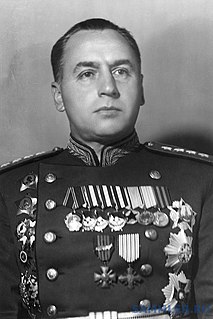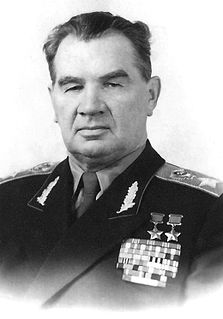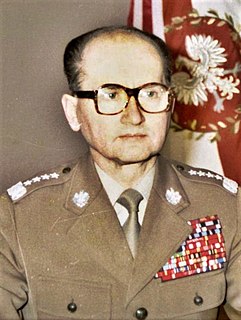 W
WTadeusz Konstanty Anders served as a captain artillery officer in the Polish Army during the Interbellum Period, and as a podpułkownik in the Polish Armed Forces during World War II. He was awarded the Virtuti Militari V Class, Poland's highest military decoration for heroism and courage in the face of the enemy at war.
 W
WAleksei Innokentievich Antonov was a General of the Soviet Army, awarded the Order of Victory for his efforts in World War II.
 W
WHamazasp Khachaturi Babadzhanian was a Soviet Armenian Chief marshal of the armored troops. He was a recipient of the Hero of the Soviet Union (1944).
 W
WStefan Bałuk was a Polish general and photographer.
 W
WZygmunt Henryk Berling was a Polish general and politician. He fought for the independence of Poland in the early 20th century. Berling was a co-founder and commander of the First Polish Army, which fought on the Eastern Front of World War II.
 W
WNikolai Alexandrovich Bulganin was a Soviet politician who served as Minister of Defense (1953–1955) and Premier of the Soviet Union (1955–1958) under Nikita Khrushchev, following service in the Red Army and as defence minister under Joseph Stalin.
 W
WVasily Ivanovich Chuikov was a Soviet military commander and Marshal of the Soviet Union. He is best known for commanding the 62nd Army which saw heavy combat during the Battle of Stalingrad in the Second World War.
 W
WJan Dobraczyński was a Polish writer, novelist, politician and Catholic publicist. In the Second Polish Republic between the two world wars, he was a supporter of the National Party and Catholic movements. During the 1939 Nazi–Soviet invasion of Poland, he was a soldier of the Polish Army and member of Armia Krajowa until the end of World War II. Dobraczyński participated in the Warsaw Uprising of 1944. After the war he supported the Polish communists. He was a member of parliament Sejms, as activist of the PAX Association and of the Patriotic Movement for National Rebirth from 1982 to 1985. He held the rank of general in the Polish military.
 W
WAnatol Fejgin was a Polish-Jewish communist activist before World War II, and after 1949, commander of the Stalinist political police at the Ministry of Public Security of Poland, in charge of its notorious Special Bureau. During the Polish October revolution of 1956, his name – along with a number of others including his colleague Col. Józef Różański, and Minister Jakub Berman – came to symbolize communist terror in postwar Poland.
 W
WAndrei Antonovich Grechko was a Soviet general, Marshal of the Soviet Union and Minister of Defense.
 W
WJuliusz Samsonowicz Hibner was a brigadier general in the Polish People's Army and recipient of the title of Hero of Soviet Union. He also served as the commander of the Internal Security Corps and later became a nuclear physicist.
 W
WWojciech Witold Jaruzelski was a Polish military officer, politician and de facto dictator of the Polish People's Republic from 1981 until 1989. He was the First Secretary of the Polish United Workers' Party between 1981 and 1989, making him the last leader of the Polish People's Republic. Jaruzelski served as Prime Minister from 1981 to 1985, the Chairman of the Council of State from 1985 to 1989 and briefly as President of Poland from 1989 to 1990, when the office of President was restored after 37 years. He was also the last commander-in-chief of the Polish People's Army, which in 1990 became the Polish Armed Forces.
 W
WIvan Stepanovich Konev was a Soviet general and Marshal of the Soviet Union who led Red Army forces on the Eastern Front during World War II, responsible for taking much of Axis-occupied Eastern Europe.
 W
WLev Zakharovich Mekhlis was a Soviet politician and a prominent officer in the Red Army from 1937 to 1940. As a senior political commissar, he became one of the main Stavka representatives on the Eastern Front (1941-1945) during World War II, being involved successively with five to seven Soviet fronts. Despite his fervent political engagement and loyalty to the Communist Party, various Soviet leaders, including Joseph Stalin, criticized and reprimanded Mekhlis for incompetent military leadership during World War II.
 W
WMieczysław Moczar was a Polish communist politician who played a prominent role in the history of the Polish People's Republic. He is most known for his unorthodox, alternative socialist views attitude which influenced Polish United Workers' Party politics in the late 1960s. During this time, Moczar and his supporters challenged Władysław Gomułka's authority.
 W
WEdward Ochab was a Polish communist politician and top leader of Poland between March and October 1956.
 W
WVasily Stepanovich Petrov was an officer in the Red Army who lost both his hands during the Battle for the Burkin Bridgehead. After becoming a double amputee he continued to serve in World War II. For his actions in the war he was twice been awarded the title Hero of the Soviet Union and promoted to the rank of major. Despite his injuries, he went on to become a general and hold a variety of command posts.
 W
WJózef Pluskowski was a Polish poet, teacher, administrator and member of the Polish Resistance under the pseudonym "Mierzwa". He played an active role in the Warsaw Ghetto Uprising and the Warsaw Uprising. He was born in Pabianice, Poland and died aged 53 in exile in Montfermeil, Paris, France.
 W
WAlexander Ivanovich Pokryshkin was one of the highest-scoring Soviet aces, and the highest-scoring pilot ever to fly an American aircraft, having achieved the great majority of his kills in the Lend-Lease Bell P-39 Airacobra. During World War II, Pokryshkin earned the title Hero of the Soviet Union three times: 24 May 1943, 24 August 1943, and 19 August 1944. After the war, he reached the rank of Marshal of Aviation.
 W
WFyodor Petrovich Polynin was a Colonel general in the Soviet Air Force, who served in the Air Force of the Polish Army during World War II and received the title Hero of the Soviet Union.
 W
WStanislav Gilyarovich Poplavsky was a general in the Soviet and Polish armies.
 W
WKonstantin Konstantinovich (Xaverevich) Rokossovsky was a Soviet and Polish officer who became Marshal of the Soviet Union, Marshal of Poland, and served as Poland's Defence Minister from 1949 until his removal in 1956 during the Polish October. He was among the most prominent Red Army commanders of World War II.
 W
WMichał Rola-Żymierski was a Polish high-ranking Communist Party leader, communist military commander and NKVD secret agent. He was appointed as Marshal of Poland by Joseph Stalin, and served in this position from 1945 until his death. He supported the 1981 imposition of Martial law in Poland.
 W
WPavel Semyonovich Rybalko was a commander of armoured troops in the Red Army during and following World War II.
 W
WVasily Danilovich Sokolovsky was a Soviet general and Marshal of the Soviet Union who led Red Army forces on the Eastern Front during World War II. As Georgy Zhukov's chief of staff, Sokolovsky helped plan and execute the Capture of Berlin.
 W
WMarian "Marek" Spychalski was a Polish architect in pre-war Poland, and later, military commander and a politician. During World War II he belonged to the Polish underground forces operating within Poland and was one of the leaders of the resistance movement Gwardia Ludowa, then Armia Ludowa.
 W
WLudvík Svoboda was a Czech general and politician. He fought in both World Wars, for which he was regarded as a national hero, and he later served as President of Czechoslovakia from 1968 to 1975.
 W
WKarol Wacław Świerczewski was a Polish and Soviet Red Army general and statesman. He was a Bolshevik Party member during the Russian Civil War and a Soviet officer in the wars fought abroad by the Soviet Union including the one against Polish as well as Ukrainian Republics and in Republican Spain. In 1939 he participated in the Soviet invasion of Poland again. At the end of World War II in Europe he was installed as one of leaders of the Soviet-sponsored Polish Provisional Government of National Unity. Soon later, Świerczewski died in a country-road ambush shot by the militants from OUN-UPA. He was an icon of communist propaganda for the following several decades.
 W
WJerzy Tumaniszwili was a Polish naval commander of a Georgian aristocratic descent. A World War II veteran and later an émigré to the United States, he received the rank of rear-admiral from the government of Poland in 2008.
 W
WAleksandr Mikhaylovich Vasilevsky was a Russian career-officer in the Red Army who attained the rank of Marshal of the Soviet Union in 1943. He served as the Chief of the General Staff of the Soviet Armed Forces (1942-1945) and Deputy Minister of Defense during World War II, and as Minister of Defense from 1949 to 1953. As the Chief of the General Staff from 1942 to 1945, Vasilevsky became involved in planning and coordinating almost all the decisive Soviet offensives in World War II, from the Stalingrad counteroffensive of November 1942 to the assaults on East Prussia, Königsberg and Manchuria.
 W
WMajor General Aleksander Waszkiewicz was a Soviet military officer of Polish descent. He served in the Red Army as commander of the 793rd Rifle Regiment during 1942–1944 and later as Deputy Commander of the 116th Rifle Division in 1944. Transferred to Polish LWP in 1944 and assigned as commander of the 5th Infantry Division of the LWP. He died in the Battle of Bautzen (1945). According to some sources, he was captured and tortured before his death.
 W
WWładysław Wysocki was an infantry captain in the Polish People's Army and recipient of the title of Hero of Soviet Union.
 W
WNikolai Pavlovich Yegipko was an officer of the Soviet Navy and a Hero of the Soviet Union. He saw action during the Russian Civil War, the Spanish Civil War, and the Second World War, and rose to the rank of vice-admiral.
 W
WAleksander Zawadzki, alias Kazik, Wacek, Bronek, One was a Polish communist politician, first Chairman of the Council of State of the People's Republic of Poland, divisional general of the Polish Army and the head of the Council of State of the Polish People's Republic from 1952 to 1964.
 W
WGeorgy Konstantinovich Zhukov was a Soviet general and Marshal of the Soviet Union. He also served as Chief of the General Staff, Minister of Defence, and was a member of the Presidium of the Communist Party. During the Second World War, Zhukov oversaw some of the Red Army's most decisive victories.